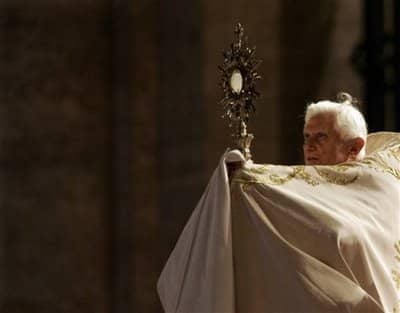It is sometime assumed that St Thomas Aquinas’ doctrine of transubstantiation teaches that Christ’s Body and Blood are present in a physical and local way.
A reading of Thomas will reveal that this is not what he means.St Thomas Aquinas states plainly that Christ’s locus or place does not move when the Sacrament is moved in space. For Thomas, the Real Presence, is not local.
On the contrary, it is impossible for the same thing to be in motion and at rest, else contradictories would be verified of the same subject. But Christ’s body is at rest in heaven. Therefore it is not movably in this sacrament.
I answer that, When any thing is one, as to subject, and manifold in being, there is nothing to hinder it from being moved in one respect, and yet to remain at rest in another just as it is one thing for a body to be white, and another thing, to be large; hence it can be moved as to its whiteness, and yet continue unmoved as to its magnitude. But in Christ, being in Himself and being under the sacrament are not the same thing, because when we say that He is under this sacrament, we express a kind of relationship to this sacrament. According to this being, then, Christ is not moved locally of Himself, but only accidentally, because Christ is not in this sacrament as in a place, as stated above (5). But what is not in a place, is not moved of itself locally, but only according to the motion of the subject in which it is.
In the same way neither is it moved of itself according to the being which it has in this sacrament, by any other change whatever, as for instance, that it ceases to be under this sacrament: because whatever possesses unfailing existence of itself, cannot be the principle of failing; but when something else fails, then it ceases to be in it; just as God, Whose existence is unfailing and immortal, ceases to be in some corruptible creature because such corruptible creature ceases to exist. And in this way, since Christ has unfailing and incorruptible being, He ceases to be under this sacrament, not because He ceases to be, nor yet by local movement of His own, as is clear from what has been said, but only by the fact that the sacramental species cease to exist.
Hence it is clear that Christ, strictly speaking, is immovable in this sacrament.
You can leave a comment by clicking here.
Join Taylor’s list and get a free book by clicking here.



Comments Policy: I reserve the right to delete comments that are offensive or off-topic. If your comment contains a hyperlink to another site, your comment automatically goes into "Comments Purgatory" where it waits for release by way of moderation.